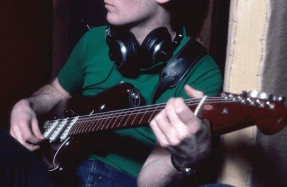The LATE ARRIVAL


WHAT IS A GUITARIST WITHOUT A GUITAR? In September 1966, George Harrison all but gave up playing the instrument when he embarked on a spiritual journey that began with his study of the sitar. With the Beatles just a few months away from recording Sgt. Pepper’s Lonely Hearts Club Band, Harrison traveled to India to begin formal lessons with sitar master Ravi Shankar. As he discovered, his education wasn’t performed over a matter of hours-long sessions, nor was it strictly about the sitar. Indian music is inextricably linked with meditation and philosophy. Hindus believe music is God, and the ragas of Indian music are extended hymns to the creator. Studying the sitar is a devotion that takes a lifetime, and which has but one aim: to reveal God.
Far from daunted, Harrison threw himself into his lessons. He was eager to find something for himself, if not of himself. After some three years of global fame as a member of the world’s most popular rock and roll band, he was suffering an identity crisis that had been some time coming. “You see your pictures and read articles about George Harrison, Ringo Starr, Paul McCartney and John Lennon,” he told a reporter in August 1963, when the Beatles were still unknown in the United States. “But you don’t actually think, Oh, that’s me. There I am in the paper. It’s funny. It’s just as though it’s a different person.”
By 1966, Harrison was known around the world, but his thoughts and ideas were concealed behind the Beatles’ identity. “The funny position I was in was that, in many ways, you know, this whole focus of attention was on the Beatles,” he recalled years later. “So in that respect I was part of it. But from being in them, an attitude came over, which was John and Paul’s.” Like Lennon and McCartney, Harrison aspired to write songs, and while the few he’d composed were strong enough to stand alongside theirs, his tunes were given less time and consideration by the band and its producer, George Martin. Harrison had even begun to lose his sense of guitar craft. He blamed the band’s constant touring and the hordes of screaming teens at their shows for his inability to develop and improve.
But in his studies with Shankar, and eventually with the help of meditation, Harrison found a way to grow not just as a musician but as a person too. The work consumed him. “[The sitar] has taken over one hundred percent of my musical life,” he told Disc and Music Echo in May 1967, eight months after he began his work with Shankar, and just days before the release of Sgt. Pepper’s Lonely Hearts Club Band, the album that featured his Indian raga–inspired track “Within You Without You.” “I still love rock, pop and electronic music. But there’s more to get immersed in, for me, in Indian [music]. I shall try to write more songs, and I think it can all be integrated into the Beatles quite nicely if I can keep improving.”
“HE WAS CLEARLY AN INNOVATOR, TAKING ELEMENTS OF R&B AND ROCK AND ROCKABILLY AND CREATING SOMETHING UNIQUE”
— ERIC CLAPTON
And then, in the summer of 1968, as abruptly, the group’s so-called White Album, recorded and released that year. Unlike many of his contributions from the past two years, the new songs were contemporary rock and roll tunes. Stylistically, however, there was nothing in the Beatles’ catalog quite like them.
You’re reading a preview, subscribe to read more.
Start your free 30 days





